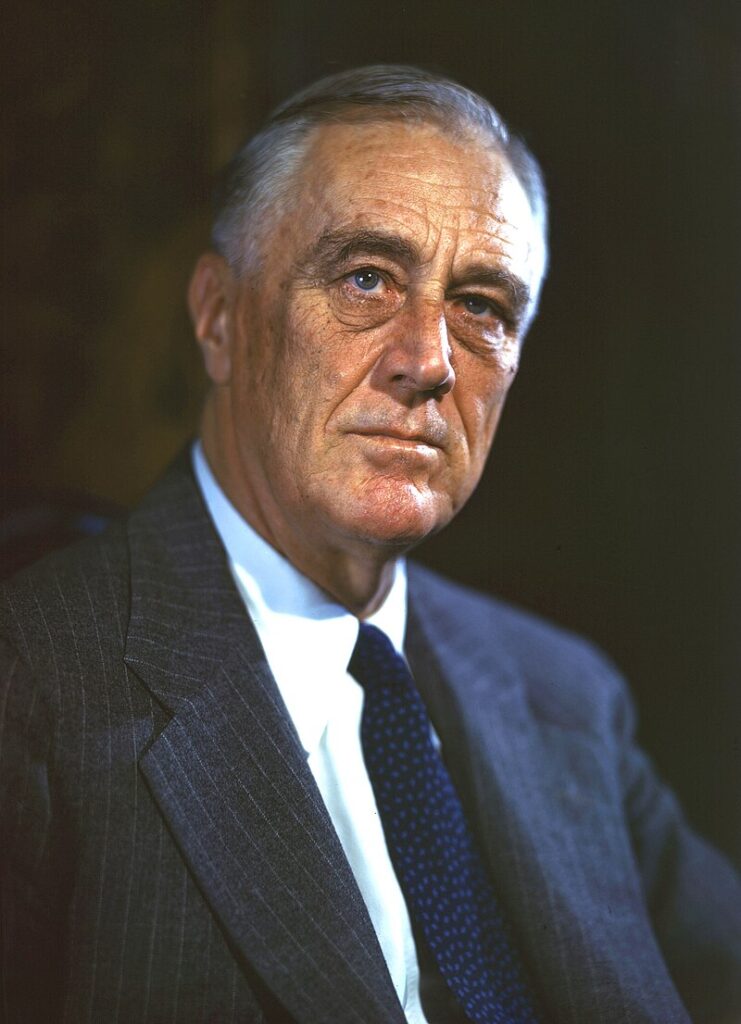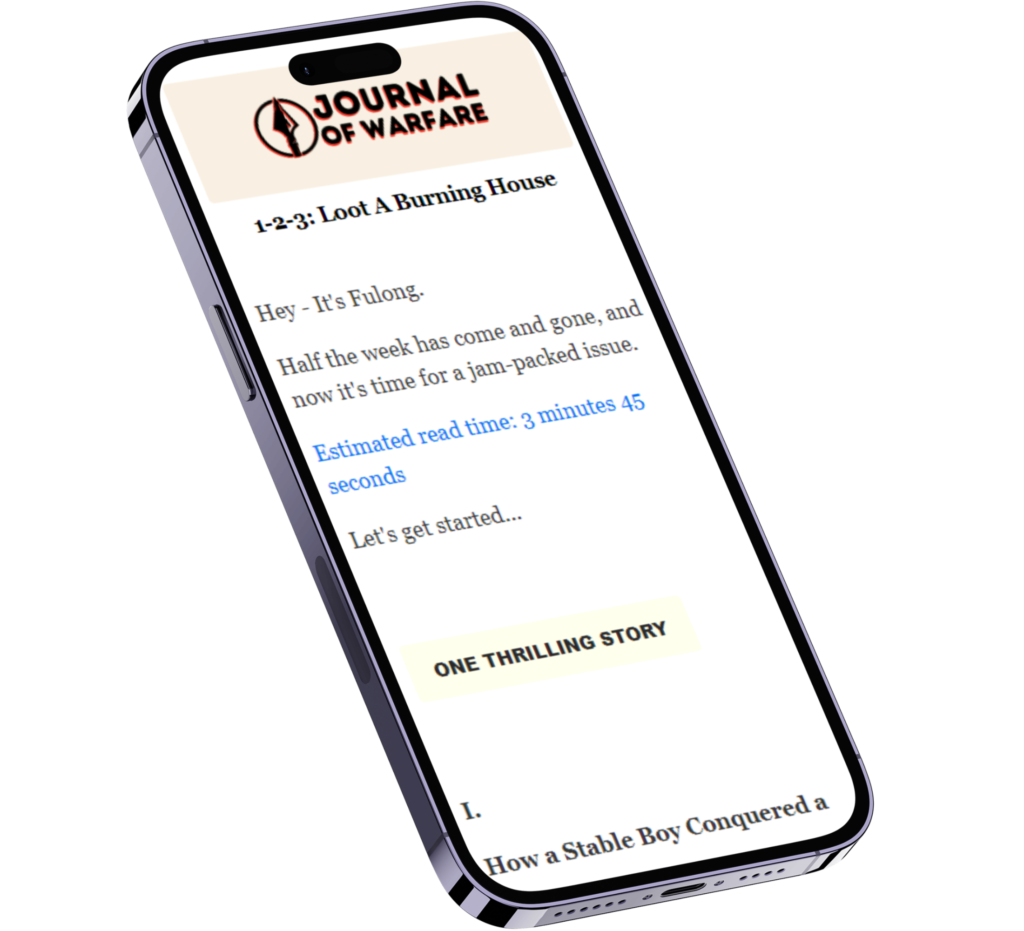Often, being the first to attack will rob you of the advantage and gift it to your opponent. Sometimes, holding back and letting the other side move first will allow you the flexibility with which you can win.
An aggressive opponent can be cleverly baited into making a rash and foolhardy attack that will leave them vulnerable to your counterattack. It is your job to learn to use their impatience to throw them off balance.
And just because the situation may seem dangerous in the moment, do not worry, do not dispar. When you hold back and suppress the urge to compulsively rush forward, the right moment will inevitable present itself when you will launch your unexpected counterattack.
This was the strategy that allowed FDR to become the only four-term American president…
FDR Waits Before Turning The Tables
After leaving his imprint on WWI, outgoing president Woodrow Wilson was replaced as the Democratic nominee by Ohio governor James Cox. His running mate was a certain thirty-eight-year-old named Franklin D. Roosevelt.
Roosevelt had served as assistant secretary of the navy under the outgoing president; more importantly, he was also the cousin of the famous Theodore Roosevelt. The Republican nominee was Warren G. Harding, and he was backed by money from big business.
As part of his campaign, the Republicans played up his folksy image and avoided talking about specifics. Understanding that the contest was going to be a gruelling affair, Cox and Roosevelt responded with sheer effort: they campaigned all around the country and focused on a single issue, American participation in the League of Nations.
Unfortunately, the race ended terribly. Harding inflicted one of the biggest defeats in US electoral history on his rivals.
The next year, Roosevelt contracted polio and lost the use of his legs which meant for the rest of his life he would use a wheelchair. Yet it also turned out to be a blessing in disguise.
The illness would be a turning point in his life for it allowed him to reassess and change his whole perspective on life and the politics of the country. He saw that for most politicians the world of politics was vicious and unscrupulous, and in order to survive you had to act in the same manner.
Understanding that this method did not suit his personality and was not physically feasible for him, he crafted a new political style, one that would differentiate him for all the others and constantly give him the advantage.
After a short stint as governor of New York, Roosevelt became the Democratic nominee for the 1932 election. The country was in the Depression, and the current president, Herbert Hoover, was incapable of dealing with it.
Hoover was in such a weak position that he was forced to go on the offensive; he labelled his rival “socialist” and constantly attacked him.
In contrast, Roosevelt went around the country and spoke to Americans about his ideas on how to deal with the crisis. Though he refrained from speaking in specifics, he radiated confidence and certainty, whilst in contrast Hoover seemed shrill and aggressive.
No matter how hard he tried, the Democrats would have likely inflicted defeat on him, but the defeat was far larger than expected and surprised one and all. In the period between the electoral victory and his inauguration, Roosevelt hid from the public and stayed quiet.
Sensing weakness, his rivals started claimed he was unfit and unprepared for the job. During his inauguration speech, however, he gave a rousing speech and quickly and fiercely used the first few months in office to hurry through badly needed legislation which the country sorely needed.
This would become known as the “Hundred Days”. Finally, Americans began to feel something was being done, and the voices of opposition gradually began to die away.
This pattern would continuously recur over the years. FDR would face resistance, whether it was from the Supreme Court or from rivals launching vicious campaigns in the press or something else.
Roosevelt would retreat from the limelight. This empty void would then be filled up with increasing vicious attacks from his rivals, and in the meantime his advisors would panic.
Eventually, he understood, the public would tire of the incessant one-sided opposition to the president, and usually a month or two before the election, he would go on the offensive.

Roosevelt would defend his record and attack his disparagers so suddenly that they would be caught of guard. It also had the added benefit of shocking the public into lending him their attention.
During those periods of silence, his opponents’ attacks would become shriller and grow in their audacity. This was perfect for Roosevelt as they were providing him with material he could use later.
One of the most famous examples came in 1944 when the Republican presidential nominee Thomas Dewey launched attacks on Roosevelt, his wife, and even his Scotch terrier Fala who was accused of being pampered at the taxpayers’ expense.
This was how Roosevelt countered in his campaign speech:
“The Republican leaders have not been content to make personal attacks upon me – or my sons – they now include my little dog, Fala. Unlike the members of my family, Fala resents this. When he learned that the Republican fiction writers had concocted a story that I left him behind on an Aleutian island and had sent a destroyer back to find him – at a cost to the taxpayer of 2 or 3, or 8 or 20 million dollars – his Scotch soul was furious. He has not been the same dog since. I am accustomed to hearing malicious falsehoods about myself, but I think I have the right to object to libelous statements about my dog.”
The speech was ruthlessly effective and even more ruthlessly funny. Moreover, he had made his reply to statements that came out of their mouths, so how could they deny they ever said them.
Time and time again, they would make the same mistakes: they would exhaust themselves by attacking him and score victories when it did not matter, in the meantime they lost landslide after landslide.
Analysis
Roosevelt hated to feel constricted and cornered, and to have no options. This was not just a part of his nature, but a natural by-product of his physical condition.
As a result, he developed a more flexible nature which allowed him to adapt effortlessly to each new situation that presented itself. Earlier in his career he had campaigned in the traditional American style: he would argue his case to the point of tedium and vigorously attack his opponents.
But over time Roosevelt learnt the power of holding back and letting his opponent make the first move. His opponent would attack him constantly and simultaneously become more and more infuriated by the lack of response Roosevelt gave him.
Not only would his opponent personally deliver the ammo Roosevelt later would use, but they would get shrill and aggressive which never played well with the public.
And once their aggressiveness had made them sufficiently vulnerable, Roosevelt would go in for the kill.
Roosevelt’s method can be compared to jujitsu, the Japanese martial art which preaches that a fighter should use the opponent’s aggressiveness to one’s own advantage. In jujitsu, whether the opponent strikes or grabs, pushes or pulls, the fighter uses that strength against him, and deftly steps back or forth to unbalance him.
Sometimes, that is enough to end the battle right there, but if not, the opponent is left in such a weak position that they are vulnerable to a counterattack.
Likening politics to jujitsu has many benefits. For one, it allows you to fight without seeming aggressive and exhausts the enemy’s energy as you conserve yours.
Additionally, it gives you more options to choose from as you adapt to and build on the opportunities your opponent presents to you. The thing about aggression is that it may seem like strength on the surface, but it really conceals weakness.
Such a person cannot wait for the right moment, they cannot entertain other options and take different approaches. After the first wave of their attack, it quickly becomes evident what underlying insecurities and weaknesses they conceal.
After all, it is not particularly hard to give in to impatience, but there is strength in holding back and waiting. Patiently holding back, then attacking when they show their weakness will invariably lead to success.
Understand that time is on your side. Use the style of jujitsu as your way of dealing with the aggression you face in everyday life.
Allow yourself to hold back and conserve valuable time and energy for your inevitable counterattack.
Footnotes & Further Reading
Greene, Robert. The 33 Strategies of War. Millionaire, 2006


